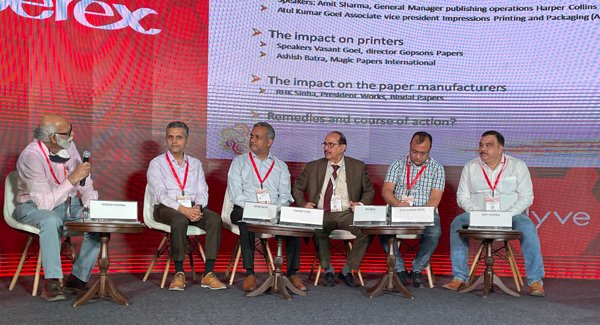
In spite of the heat wave in North India, the Paperex 2022 exhibition in Greater Noida, had tremendous participation by the paper industry, its suppliers and customers who by and large are printers. Partly a reflection of the keen-ness of the industry to return to business, the printers and packaging converters have taken the opportunity to network with paper companies so that the upsurge in demand and their return to business is acknowledged and to ensure that they can get the best prices and delivery times for raw materials.
For the paper companies it is reassuring to see that demand has returned and as several printers said in one of the panel discussion in the Paperex 2022 Conference, that I moderated, production levels and print demand especially for books, is currently exceeding pre-pandemic 2019 levels. The discussion took up the supply chain breakdowns for raw materials in paper and the strikes and increased energy charges in Europe as well as the way forward from the two years of the pandemic.
Amit Sharma of Harper Collins was emphatic that demand is back and the opportunity should not be missed to both grow the domestic market and exports of book production. Vasant Goel of Gopsons and Ashish Batra of Magic Papers International agreed, and the printers concurred and emphasized that more than ever before there is a need to expand and improve the manufacture of publication papers.
There seems to be no shortage of book printing paper in India because the Indian paper mills have been able to improve their quality and also because the many of the leading book printers have increased their storage of paper stocks over the past two years of the pandemic. A packaging converter in the conference audience Pratik Chheda of Shapes Cubes Packaging in Gujarat, said that he was able to get locally manufactured paper and board within a day and the delivery time for imported paper and paperboard was not more than two days.
When I questioned the panellists on the role of the edutech companies in Indian education both Amit Sharma and Vasant Goel responded. Sharma said that first of all the edutech companies are creating educational content and as the country and they want their digital content published in ink and paper formats also. Additionally, even online education requires tools and accessories so the product mix of the publishers has adapted to enable the supply of teacher training materials and stationary. Goel added that edutech company Byju’s has a current budget of Rs 100 crore (US$ 13 million) for print materials. Thus the burgeoning edutech industry is likely to add to print volumes both directly and indirectly by enabling a young population that is both literate and with the resources to acquire more materials for their creative and competitive educational pursuit of higher studies.
There seems to be some sentiment that some paper traders have exploited the current news of raw material shortages and global logistics prices and shortage of containers to resell their stored paper and paperboard at higher prices. Thus while we have been hearing of paper shortages in Europe partly caused by the UPM four month strike that ended this month in an agreement largely meeting the demands of the Finland unions including Paperlito, in India the book publication papers are of sufficient quality and supply. The book printing exporters have built up stocks to meet their immediate commitments but in the future there is a need to upgrade the quality of publication papers.
Around the Paperex 2022 exhibition we have also been receiving the news of the Indian paper mills rebuilding their pulping capacity with higher and more sustainable technology as well as putting in better technologies in their paper machines especially for corrugation liner and paper boards. The sore point in Indian paper demand remains high quality publication papers and especially quality newsprint that can be run efficiently on automated high speed web offset presses.








